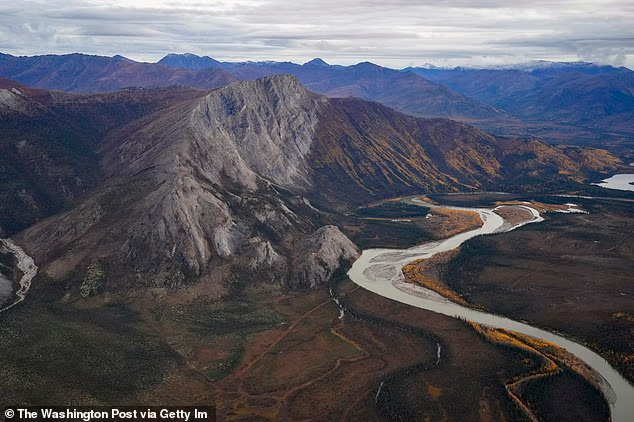Race against time to build a 211-mile gravel track across America's most extreme frontier for new 'Manhattan Project'... but it could be too late
China's control over the globe's rare earth mineral supply poses an espionage and military threat to America and the world, a Trump Cabinet secretary warns.
The Communist regime in Beijing last week announced sweeping restrictions on the material which is critical to America's automotive, defense and technology industries.
China controls 90 percent of the world's processed supply, giving it a stranglehold over America's F-35 fighter jets, military radars and chips for AI.
'This is a whole-of-government attack by China,' Department of the Interior Secretary Doug Burgum told the Daily Mail in an exclusive interview.
'This was not just a shot across the bow, this latest set of export controls, but this is a serious attack on the rest of the free world and everybody's ability to run their economies without China exerting due control.'
Donald Trump on Friday retaliated by declaring an additional 100 percent tariff on China, sending markets into a frenzy before they rallied on Monday.
Even more concerning, Burgum said, is how China is using export controls to glean sensitive information from US companies.
'When we say export controls, that sounds like a benign little thing, but it's actually just a misrepresentation of what they're doing, which is intelligence gathering,' the secretary stressed.

Department of the Interior Secretary Doug Burgum told the Daily Mail that China uses export controls to gather intelligence on US companies and that it is 'crazy' how dependent the US is on its chief adversary for components critical to national security

China announced it would add export controls to five additional rare earth materials last Thursday. The restrictions could threaten US supply chains reliant on China for military and AI products

President Donald Trump retaliated against China for the announcement by adding an additional 100 percent tariff on Chinese products, in addition to the tariffs the country is already facing from the US
China's policy, according to the former North Dakota governor and businessman, requires US firms to hand over proprietary details that China may use against those very companies, and even the US government.
'Look at what the export controls from China actually contain, it's like, 'Oh, send us pictures of your production facilities, explain to us exactly what quantities you use of these minerals and these magnets, and for what uses, is it commercial? Is it defense?'
'I mean, this is kind of information that a Wall Street analyst could never get out of a company,' Burgum said.
In addition to controlling most of the world's rare earth mining operations, estimates suggest that China controls a monopoly on rare earth mineral refining - the process that turns the raw materials into usable forms for industry.
For example, China controls all of the world's samarium refining, a mineral critical to F-35 fighter jets and US missiles.
It also has a chokehold on dysprosium, a magnetic material used in electric vehicles and chips, refining 99 percent of the globe's supply.
Burgum says he's trying to break China's strangle on the global supply. Part of that effort is unlocking federal lands that contain rare earth minerals.

'Ambler Mining Road to be built in Alaska, 211-mile-long road into the interior, is a gravel industrial road that will provide access to one of the richest mining areas that the United States has, and really one of the most important ones in the world,' Burgum shared

Workers use machinery to dig at a rare earth mine in Ganxian county in central China's Jiangxi province

Ships are berthed at the container terminal of the port in Qingdao, in China's eastern Shandong province on October 9, 2025. President Trump announced an additional 100 percent tariff on China on October 10 and threatened to cancel a summit with Xi Jinping, reigniting his trade war with Beijing in a row over export curbs on rare earth minerals.

Burgum celebrated Trump's plan to reopen the Ambler Road in Alaska, a gravel path that cuts through sensitive wildlife areas to some of the state's richest rare earth mines
'Ambler Mining Road to be built in Alaska, 211-mile-long road into the interior, is a gravel industrial road that will provide access to one of the richest mining areas that the United States has, and really one of the most important ones in the world,' Burgum shared.
'Key elements there include cobalt, copper, germanium and gallium. These are all things where the US is dependent for defense and for our auto industry, for everything.'
The secretary noted how the US has 'crazy dependencies' on China and that he has worked directly with Trump to mitigate America's reliance on its chief adversary.
One of the first steps, he said, was to go over the periodic table of elements with other administration members to identify the most needed materials.
'The mandate starts, really, with the periodic table,' the secretary stated.

US Secretary of the Interior and Chair, National Energy Council and White House Energy Czar Doug Burgum gives remarks to the media during an executive order signing event regarding mining in Alaska

A sample of bastnaesite ore, a mineral used in the rare earth industry to extract elements such as cerium, lanthanum, and neodymium, is displayed at the Geological Museum of China
'Between the National Energy Dominance Council and the National Security Council, there's an effort going on to secure these supply chains, and literally looking at the periodic table, what are the 20 most critical minerals, what percentage of those are being controlled by China, and then what can we do working ourselves and with our allies and with the private sector?'
The US effort to secure supply chains for these minerals is akin to the Manhattan Project, the ultra-secret operation to develop the nuclear bomb during WWII, Burgum said.
'It is a full-bore, whole-of-government [approach],' he disclosed, adding the administration thinks 'of this as, like, a Manhattan project or a Warp Speed project to make sure that we are getting ourselves out of being dependent on China.'























































































































































































































































































































































